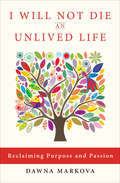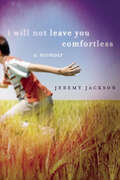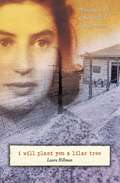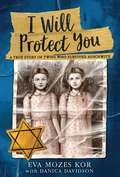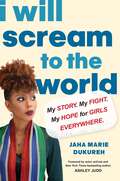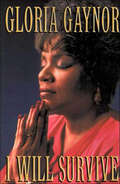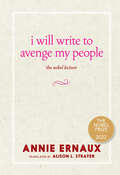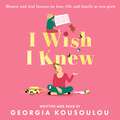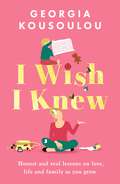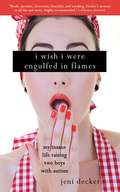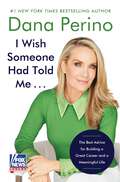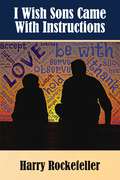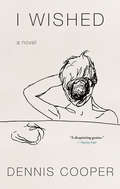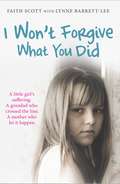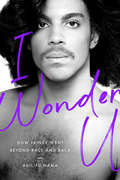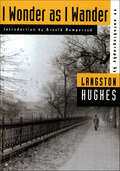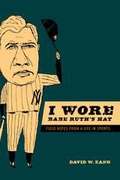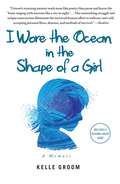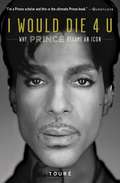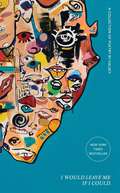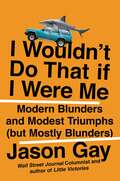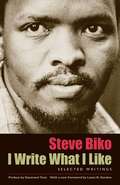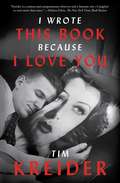- Table View
- List View
I Will Not Die an Unlived Life: Reclaiming Purpose and Passion
by Dawna MarkovaThe author and psychotherapist shares her journey of illness and recovery in this inspiring guide to living your life to the fullest. In I Will Not Die an Unlived Life, Dawna Markova recounts her incredible journey from being diagnosed with a life-threatening illness to finding deeper meaning in her life. Along the way, she guides readers toward discovering their own sense of value and purpose. When we feel lost, Markova points out, we can either continue to live habitual lives and resign our strength—or we can choose to follow our passions. Many of us have times of feeling stagnant and sapped of energy. Rather than judging these moments negatively, Dr. Markova reframes them as periods of rest for our passions. In doing so, she challenges us to slow down and stay in touch with ourselves. Poetic and inspiring, I Will Not Die an Unlived Life is a powerful reminder that it is never too late to live your life.
I Will Not Leave You Comfortless: A Memoir
by Jeremy JacksonThis memoir of “a happy childhood in rural Missouri just before the digital revolution [is] a sweet record of a time and a place that was not Always On.” —St. Louis Post-DispatchSpanning one year of the author’s life—1984—I Will Not Leave You Comfortless is the intimate memoir of a young boy coming to consciousness in small-town Missouri. The year will bring ten-year-old Jeremy first loves, first losses, and a break from the innocence of boyhood that will never be fully repaired. For Jeremy, the seeming security of his life on the family farm is forever shaken by the life-altering events of that pivotal year. Throughout, he recalls the deeply sensual wonders of his rural Midwestern childhood—bicycle rides in September sunlight; the horizon vanishing behind tall grasses—while stories both heart-wrenching and humorous, tragic and triumphant, Jackson weaves past, present, and future into the rich Missouri landscape.“I could smell the mulberries crushed underfoot and the sweet steam of the cinnamon roll Grandma heated in the toaster oven just for Jeremy, hear the ever-increasing volume of an approaching late-spring storm . . . The year of Jeremy Jackson’s life on which he meditates in I Will Not Leave You Comfortless marked his transition from the perfect happiness of childhood to the much more complex reality of adulthood. It records, as well, the abiding comfort that remains—family, home and love.” —Wichita Eagle“Jackson writes about Missouri as the young Hemingway wrote about Michigan: with a clear eye; with hard-edged nostalgia; and (here’s the thing) with brilliance.” —Darin Strauss, author of Half a Life
I Will Plant You A Lilac Tree: A Memoir Of A Schindler's List Survivor (Hampton-brown Edge)
by Laura HillmanIn the spring of 1942, Hannelore Wolff left school to join her family in a Jewish concentration camp. But amidst the suffering, she found the will to survive.
I Will Plant You a Lilac Tree
by Laura Hillman"HANNELORE, YOUR PAPA IS DEAD." In the spring of 1942 Hannelore received a letter from Mama at her school in Berlin, Germany--Papa had been arrested and taken to a concentration camp. Six weeks later he was sent home; ashes in an urn. Soon another letter arrived. "The Gestapo has notified your brothers and me that we are to be deported to the East--whatever that means." Hannelore knew: labor camps, starvation, beatings...How could Mama and her two younger brothers bear that? She made a decision: She would go home and be deported with her family. Despite the horrors she faced in eight labor and concentration camps, Hannelore met and fell in love with a Polish POW named Dick Hillman. Oskar Schindler was their one hope to survive. Schindler had a plan to take eleven hundred Jews to the safety of his new factory in Czechoslovakia. Incredibly both she and Dick were added to his list. But survival was not that simple. Weeks later Hannelore found herself, alone, outside the gates of Auschwitz, pushed toward the smoking crematoria. I Will Plant You a Lilac Tree is the remarkable true story of one young woman's nightmarish coming-of-age. But it is also a story about the surprising possibilities for hope and love in one of history's most brutal times.
I Will Protect You: A True Story of Twins Who Survived Auschwitz
by Eva Mozes KorThe illuminating and deeply moving true story of twin sisters who survived Nazi experimentation, against all odds, during the Holocaust.Eva and her identical twin sister, Miriam, had a mostly happy childhood. Theirs was the only Jewish family in their small village in the Transylvanian mountains, but they didn't think much of it until anti-Semitism reared its ugly head in their school. Then, in 1944, ten-year-old Eva and her family were deported to Auschwitz. At its gates, Eva and Miriam were separated from their parents and other siblings, selected as subjects for Dr. Mengele's infamous medical experiments.During the course of the war, Mengele would experiment on 3,000 twins. Only 160 would survive--including Eva and Miriam.Writing with her friend Danica Davidson, Eva reveals how two young girls were able to survive the unimaginable cruelty of the Nazi regime, while also eventually finding healing and the capacity to forgive. Spare and poignant, I Will Protect You is a vital memoir of survival, loss, and forgiveness.
I Will Scream to the World: My Story. My Fight. My Hope for Girls Everywhere.
by Jaha Marie DukurehThis extraordinary memoir details the monumental journey of one young Gambian woman from survivor of FGM and forced child marriage, to global activist and political leader who became UN Women's first Goodwill Ambassador for Africa, one of Time Magazine&’s 100 Most Influential People, and among the youngest people nominated for the Nobel Peace Prize.On the wedding night of her first arranged marriage, fifteen-year-old Jaha learned that she had undergone Female Genital Mutilation (FGM) as an infant. That painful discovery, coupled with her experiences with a second arranged marriage, set Jaha on her path as an activist—a courageous mission that would require her to brave hostility in her community and family, and even attempts on her life. Despite the challenges, and with ever-growing determination, Jaha founded Safe Hands for Girls, an organization that succeeded in having FGM banned in Gambia. She is now working to eradicate FGM and forced child marriage worldwide by 2030 and running to be the next President of The Gambia. I Will Scream to the World! recounts Jaha&’s ongoing, uphill journey to be seen as a survivor, activist, but most of all as a human. She dives into her childhood to show the root causes of her crusading, shares her personal and professional life, and explores, as only a survivor can, a practice that while violent and troubling, is often culturally misunderstood. Above all, Jaha&’s unflinchingly honest memoir is a story of resilience and extraordinary fearlessness, of the strength that comes with learning to love oneself, and of the power within everyone to create meaningful and lasting change.
I Will Survive: The Book
by Gloria GaynorI Will Survive is the story of Gloria Gaynor, America's "Queen of Disco." It is the story of riches and fame, despair, and finally salvation. Her meteoric rise to stardom in the mid-1970s was nothing short of phenomenal, and hits poured forth that pushed her to the top of the charts, including "Honey Bee," "I Got You Under My Skin," "Never Can Say Goodbye," and the song that has immortalized her, "I Will Survive," which became a #1 international gold seller. With that song, Gloria heralded the international rise of disco that became synonymous with a way of life in the fast lane - the sweaty bodies at Studio 54, the lines of cocaine, the indescribable feeling that you could always be at the top of your game and never come down. But down she came after her early stardom, and problems followed in the wake, including the death of her mother, whose love had anchored the young singer, as well as constant battles with weight, drugs, and alcohol. While her fans always imagined her to be rich, her personal finances collapsed due to poor management; and while many envied her, she felt completely empty inside. In the early 1980s, sustained by her marriage to music publisher Linwood Simon, Gloria took three years off and reflected upon her life. She visited churches and revisited her mother's old Bible. Discovering the world of gospel, she made a commitment to Christ that sustains her to this day.
I Will Write to Avenge My People: The Nobel Lecture
by Annie ErnauxPublished for the first time in a beautiful collectible edition, the essential lecture delivered by the 2022 recipient of the Nobel Prize in Literature, Annie Ernaux.«J&’écrirai por venger ma race»It was as a young woman that Annie Ernaux first wrote these words in her diary, giving a name to her purpose in life as a writer. She returns to them in her stirring defense of literature and of political writing in her Nobel Lecture, delivered in Stockholm on December 7, 2022.To write of her own life, she asserts, is to &“shatter the loneliness of experiences endured and repressed;&” to mine individual experience is to find collective emancipation. Ernaux&’s speech is a bold assertion of the capacity of writing to give people a sense of their own worth, and of one writer&’s commitment to bearing witness to life, its joys and its injustices.Includes Annie Ernaux's Nobel lecture, her Nobel banquet speech, a congratulatory speech by Professor Anders Olsson, Chair of the Nobel Committee for Literature, and the Nobel opening address by Professor Carl-Henrik Heldin, Chairman of the board of the Nobel Foundation.
I Wish I Knew: Lessons on love, life and family as you grow - the perfect gift for Mother’s Day
by Georgia KousoulouLessons on love, life and family as you grow - the first beautiful book from online agony aunt and TV star, Georgia Kousoulou.I wish I knew... the 2am night-feed silence is deafening how to find myself after becoming a mum that one day, I'd have all the courage I'd ever need'When I first became a mum, I lost my own identity for a while. It's almost expected that it's entirely what you become: Mum with a capital M. I wrote this book for anyone who has ever felt overwhelmed, alone or who needs to hear someone else saying what they are thinking! I Wish I Knew is everything I wish I had known, and so much more...'----In her honest, down-to-earth style (with nothing off-limits!) TV star and online agony aunt Georgia shares the lessons she's learnt about family, relationships and love. No matter how much time you have to delve in, you will find the perfect pick-me-up inside. Have a break with a short essay or dive into a longer chapter, all featuring Georgia's best pieces of advice at the end.Alongside Georgia's journey to motherhood and everything that comes with it - the ups and the downs - fill in your own thoughts in the book's journal section and share what you wish you had known, too.
I Wish I Knew: Lessons on love, life and family as you grow - the perfect gift for Mother’s Day
by Georgia KousoulouLessons on love, life and family as you grow - the first beautiful book from online agony aunt and TV star, Georgia Kousoulou.I wish I knew... the 2am night-feed silence is deafening how to find myself after becoming a mum that one day, I'd have all the courage I'd ever need'When I first became a mum, I lost my own identity for a while. It's almost expected that it's entirely what you become: Mum with a capital M. I wrote this book for anyone who has ever felt overwhelmed, alone or who needs to hear someone else saying what they are thinking! I Wish I Knew is everything I wish I had known, and so much more...'----In her honest, down-to-earth style (with nothing off-limits!) TV star and online agony aunt Georgia shares the lessons she's learnt about family, relationships and love. No matter how much time you have to delve in, you will find the perfect pick-me-up inside. Have a break with a short essay or dive into a longer chapter, all featuring Georgia's best pieces of advice at the end.Alongside Georgia's journey to motherhood and everything that comes with it - the ups and the downs - fill in your own thoughts in the book's journal section and share what you wish you had known, too.
I Wish I Were Engulfed in Flames: My Insane Life Raising Two Boys with Autism
by Jeni DeckerJeni Decker is five-foot nothing and one hundred and [redacted] pounds-a self described roly-poly, forty-something, Reubenesque bon-bon of a gal, often called cute but never sexy. She has two sons with autism on opposite ends of the spectrum (Jake and Jaxson), a husband who prefers hunting to household chores, an Australian Shepherd named Sugar, and an albino frog named Humbert Humbert. This is her story-a brash, personal, and some-times shocking memoir of one woman's determination to raise two healthy kids with autism and keep her sanity in the process. It's not always easy. Between "poop" incidents, temper tantrums, and the "helpful" advice about parenting from her fellow citizens in the grocery store, Jeni often finds herself wanting to throw something. With chapters like: "Tickling the Weiner," "Why I Hate Pokemon," "Santa: Give it a Friggin' Rest, Already," and "Oprah's the Reason My Kid Thinks I Want to Drown Him in the Tub," I Wish I Were Engulfed in Flames also includes mini-chapters written by her eldest son, Jake.Readers looking for laughter and inspiration will find it here aplenty, along with tons of surreal anecdotes that will have you either shaking your head in disbelief (for those unacquainted with the world of autism) or nodding with recognition (for those who are). As Jeni says, "I developed a new 'normal.'"
I Wish Someone Had Told Me . . .: The Best Advice for Building a Great Career and a Meaningful Life
by Dana PerinoTerrific advice, insightful stories, and powerful life lessons curated by Dana Perino the #1 New York Times bestselling author of And the Good News Is . . . and beloved co-host of Fox News' The Five and America’s Newsroom, inspired by her friends and colleagues.I Wish Someone Had Told Me . . . is a blueprint for success in your life and career. An all-star line-up of Dana’s lifelong friends and Fox News personalities with wide-ranging talents and accomplishments share amazing stories about their own experiences, offering invaluable guidance and wisdom on a range of subjects, including:Finding the right path and getting your foot in the door;How to break out in your job and get recognized;Making a transition in your career and betting on yourself;How to keep improving and adding new skills;Balancing relationships, avoiding burnout, and having a life;And much more.This illuminating and essential book is ideal for new graduates and everyone starting their first job; professionals thinking about making a change, transitioning into a different position, or phasing into a new career or act in life; and anyone looking for timeless insight and a helpful resource for self-improvement and career enhancement.Contributors include: Bret Baier, Dierks Bentley, Ainsley Earhardt, Jimmy Failla, Harold Ford Jr., Trey Gowdy, Greg Gutfeld, Benjamin Hall, Bill Hemmer, Lawrence Jones, Martha MacCallum, Charles Payne, Judge Jeanine Pirro, John Roberts, Mike Rowe, Jessica Tarlov, Jesse Watters, Salena Zito, Tyrus, and many more.
I Wish Sons Came With Instructions
by Harry RockefellerWithin these pages I hope you get to know me. Mostly, I hope you come to realize my intent to carry out my calling by God to raise my own sons to know their Heavenly Father. I enjoyed a good loving human father but only for the first 18 years of my life. Raising my sons had to be done without his help. But, rather than being at a disadvantage, I knew I had a great opportunity to lean on a promise to those in submission to the Holy God found in the pages of the Bible. He is "father of the fatherless". [Psalm 68:5]This book is not just about general principles: love God, abide in Christ, love your sons, be humble, deny yourself, etc. These are all important but here I share personal stories about dealing with my sons at all stages of life. My one-year-old woke up screaming from a nightmare. He's barely able to talk. What do I say or do? My 3-year-old loves his independence walking at his pace. Next, he decides he is big enough to carry a large package by himself out of a store. Should I let him try? When should I talk to my son about sex? What should I say? How concerned should I be about what he is being taught in public school? What should I do if it doesn't agree with what I actually want my son to be taught? How do I "teach" my adult son to think for himself about what is right or wrong, good or evil? All these questions and more are answered using real family stories. But, by themselves, my life stories, no matter how interesting, is not the main point. My Heavenly Father gave me the answers, so in these stories you will also find relevant Scripture.The main point is to cause something written here to resonate with you. Maybe a memory of something your Mom, Dad, or Grandma said to you when you were a child would suddenly fill your mind and, right now you would have a decision to make. Do I want to love my own son as I know I should? Am I being selfish if I spend this money in this way? Perhaps you need to make a decision. You may have more than one path ahead of you and don't know which way to turn. Should I open my Bible and pray for godly wisdom for myself and my wife in what to do with our son? If not for your sake, get close to your Heavenly Father for the sake of your son. Build a parenting foundation on the Word of God.I pray you would cultivate a relationship with your loving Heavenly Father and teach that to your own son.
I Wished
by Dennis Cooper&“I started writing books about and for my friend George Miles because whenever I would speak about him honestly like I am doing now I felt a complicated agony beneath my words that talking openly can&’t handle.&”For most of his life, Dennis Cooper believed the person he had loved the most and would always love above all others was George Miles. In his first novel in ten years, Dennis Cooper writes about George Miles, love, loss, addiction, suicide, and how fiction can capture these things, and how it fails to capture them. Candid and powerful, I Wished is a radical work of shifting forms. It includes appearances by Santa Claus, land artist James Turrell, sentient prairie dogs, John Wayne Gacy, Nick Drake, and George, the muse for Cooper&’s acclaimed novels Closer, Frisk, Try, Guide, and Period, collectively known as &“The George Miles Cycle.&” In revisiting the inspiration for the Cycle, Dennis has written a masterwork: the most raw, personal, and haunted book of his career.
I Won't Forgive What You Did: A little girl's suffering. A mother who let it happen
by Faith Scott Lynne Barrett-LeeBorn the third of eight children into a life of rural squalor in a farming community in the south of England, Faith Scott's infant world is already more challenging than most. Bewildered by the bizarre andcruel behaviour of her mother and terrified by the violent outbursts of her perpetually angry father, the only certainty in life is that there is none. So when Granddad 'Pop' gives her sweets and does the horrid things he does to her, how is she to know that isn't what all Granddads do? And if it isn't, why does her mother find it funny? Told with honesty and courage, this is the story of a little girl who never stood a chance - who was regularly abused in the most shocking ways by her family and preyed upon by the worst kind of men. Faith went on to have two children in her teens and endured appalling domestic violence but now, after all the suffering, she has turned her life around. Her decades-long journey out of the darkness tells the truth about what happens to abused children when they grow up, in a story that's horrifying and compelling in equal measure.
I Wonder U: How Prince Went beyond Race and Back
by Adilifu NamaIn 1993, Prince infamously changed his name to a unique, unpronounceable symbol. Yet this was only one of a long string of self-reinventions orchestrated by Prince as he refused to be typecast by the music industry’s limiting definitions of masculinity and femininity, of straightness and queerness, of authenticity and artifice, or of black music and white music. Revealing how he continually subverted cultural expectations, I Wonder U examines the entirety of Prince’s diverse career as a singer, multi-instrumentalist, songwriter, producer, record label mogul, movie star, and director. It shows how, by blending elements of R&B, rock, and new wave into an extremely videogenic package, Prince was able to overcome the color barrier that kept black artists off of MTV. Yet even at his greatest crossover success, he still worked hard to retain his credibility among black music fans. In this way, Adilifu Nama suggests, Prince was able to assert a distinctly black political sensibility while still being perceived as a unique musical genius whose appeal transcended racial boundaries.
I Wonder as I Wander: An Autobiography (American Century #Vol. 14)
by Langston HughesIn I Wonder as I Wander, Langston Hughes vividly recalls the most dramatic and intimate moments of his life in the turbulent 1930s.His wanderlust leads him to Cuba, Haiti, Russia, Soviet Central Asia, Japan, Spain (during its Civil War), through dictatorships, wars, revolutions. He meets and brings to life the famous and the humble, from Arthur Koestler to Emma, the Black Mammy of Moscow. It is the continuously amusing, wise revelation of an American writer journeying around the often strange and always exciting world he loves.
I Wore Babe Ruth's Hat: Field Notes from a Life in Sports
by David W. ZangDavid W. Zang played junior high school basketball in a drained swimming pool. He wore a rubber suit to bed to make weight for a wrestling meet. He kept a log as an obsessive runner (not a jogger). In short, he soldiered through the life of an ordinary athlete. Whether pondering his long-unbuilt replica of Connie Mack Stadium or his eye-opening turn as the Baltimore Ravens' mascot, Zang offers tales at turns poignant and hilarious as he engages with the passions that shaped his life. Yet his meditations also probe the tragedy of a modern athletic culture that substitutes hyped spectatorship for participation. As he laments, American society's increasing scorn for taking part in play robs adults of the life-affirming virtues of games that challenge us to accomplish the impossible for the most transcendent of reasons: to see if it can be done. From teammates named Lop to tracing Joe Paterno's long shadow over Happy Valley, I Wore Babe Ruth's Hat reports from the everyman's Elysium where games and life intersect.
I Wore the Ocean in the Shape of a Girl: A Memoir
by Kelle GroomAt the age of fifteen, Kelle Groom found that alcohol allowed her to connect with people and explore intimacy in ways she’d never been able to experience before. She began drinking before class, often blacked out at bars, and fell into destructive relationships. At nineteen, already an out-of-control alcoholic, she was pregnant. Accepting the heartbreaking fact that she was incapable of taking care of her son herself, she gave him up for adoption to her aunt and uncle. They named him Tommy and took him home with them to Massachusetts. When he was nine months old, the boy was diagnosed with leukemia—but Kelle’s parents, wanting the best for her, kept her mostly in the dark about his health. When Tommy died he was only fourteen months old. Having lost him irretrievably, Kelle went into an accelerating downward spiral of self-destruction. She emerged from this free fall only when her desire to stop drinking connected her with those who helped her to get sober.In stirring, hypnotic prose, I Wore the Ocean in the Shape of a Girl explores the most painful aspects of Kelle’s addiction and loss with unflinching honesty and bold determination. Urgent and vital, exquisite and raw, her story is as much about maternal love as it is about survival, as much about acceptance as it is about forgiveness. Kelle’s longing for her son remains twenty-five years after his death. It is an ache intensified, as she lost him twice—first to adoption and then to cancer. In this inspiring portrait of redemption, Kelle charts the journey that led her to accept her addiction and grief and to learn how to live in the world. Through her family’s history and the story of her son’s cancer, Kelle traces with clarity and breathtaking grace the forces that shape a life, a death, and a literary voice.
I Would Die 4 U: Why Prince Became an Icon
by TouréCelebrated journalist, TV personality, and award-winning author Touré investigates one of the most enigmatic and fascinating figures in contemporary American culture: Prince. Celebrated journalist, TV personality, and award-winning author Touré investigates one of the most enigmatic and fascinating figures in contemporary American culture: PRINCEDrawing on new research and enlivened by Touré's unique pop-cultural fluency, I Would Die 4 U relies on surprising and in-depth interviews with Prince's band members, former girlfriends, musicologists, and even Bible scholars to deconstruct the artist's life and work. Prince's baby boomer status allowed him to play a wise older brother to the latchkey kids of generation X. Defying traditional categories of race, gender, and sexuality, he nonetheless presents a very traditional conception of religion and God in his music. He was an MTV megastar and a religious evangelist, using images of sex and profanity to invite us into a musical conversation about the healing power of God. By demystifying the man and his music, I Would Die 4 U shows us how Prince defined a generation.
I Would Leave Me If I Could.: A Collection of Poetry
by HalseyGrammy Award–nominated, platinum-selling musician Halsey is heralded as one of the most compelling voices of her generation. In I Would Leave Me If I Could, she reveals never-before-seen poetry of longing, love, and the nuances of bipolar disorder. <p><p> In this debut collection, Halsey bares her soul. Bringing the same artistry found in her lyrics, Halsey’s poems delve into the highs and lows of doomed relationships, family ties, sexuality, and mental illness. More hand grenades than confessions, these autobiographical poems explore and dismantle conventional notions of what it means to be a feminist in search of power. Masterful as it is raw, passionate, and profound, I Would Leave Me If I Could signals the arrival of an essential voice. Book cover painting, American Woman, by the author. <p> <b>A New York Times Bestseller</b>
I Wouldn't Do That If I Were Me: Modern Blunders and Modest Triumphs (but Mostly Blunders)
by Jason GayThe Wall Street Journal columnist and bestselling author of Little Victories takes a humorous and insightful look at life in the face of overwhelming societal change that we never anticipated—from the effects on parenthood, marriage, friendship, work, and play to all other aspects of the strange lives we find ourselves living. Like many of us, Jason Gay didn&’t see this coming: a reshaped world, on edge, often stuck at home, questioning everything, trying to navigate a digital landscape that changes how we think, parent, coach, and live. With a series of topical and interconnected personal pieces, Gay comically takes on this new state of being, looking for the optimism and joy in the face of discouragement. He embarks on a rowdy ride with his son to the Daytona 500, weeks before lockdown. He confides his hilariously banal texts with his wife. He allows his mom to kidnap the family cat. From the modest thrills of Little League parenting to reckoning with the impending death of a close friend, Gay's essays run the gamut of modern life and he approaches it all with humility, grace, and more than a few laughs.
I Write What I Like: Selected Writings
by Steve BikoEdited by Aelred Stubbs, this book contains a selection of Biko's writings from 1969, when he became the president of the South African Students' Organization, to 1972, when he was prohibited from publishing.
I Write What I Like: Selected Writings
by Steve Biko"The most potent weapon in the hands of the oppressor is the mind of the oppressed." Like all of Steve Biko's writings, those words testify to the passion, courage, and keen insight that made him one of the most powerful figures in South Africa's struggle against apartheid. They also reflect his conviction that black people in South Africa could not be liberated until they united to break their chains of servitude, a key tenet of the Black Consciousness movement that he helped found.I Write What I Like contains a selection of Biko's writings from 1969, when he became the president of the South African Students' Organization, to 1972, when he was prohibited from publishing. The collection also includes a preface by Archbishop Desmond Tutu; an introduction by Malusi and Thoko Mpumlwana, who were both involved with Biko in the Black Consciousness movement; a memoir of Biko by Father Aelred Stubbs, his longtime pastor and friend; and a new foreword by Professor Lewis Gordon. Biko's writings will inspire and educate anyone concerned with issues of racism, postcolonialism, and black nationalism.
I Wrote This Book Because I Love You: Essays
by Tim Kreider*A People Top 10 Book of 2018* The New York Times essayist and author of We Learn Nothing, Tim Kreider trains his singular power of observation on his (often befuddling) relationships with women.Psychologists have told him he&’s a psychologist. Philosophers have told him he&’s a philosopher. Religious groups have invited him to speak. He had a cult following as a cartoonist. But, above all else, Tim Kreider is an essayist—one whose deft prose, uncanny observations, dark humor, and emotional vulnerability have earned him deserved comparisons to David Sedaris, Sarah Vowell, and the late David Foster Wallace (who was himself a fan of Kreider&’s humor). &“Beautifully written, with just enough humor to balance his spikiness&” (Booklist), I Wrote This Book Because I Love You focuses Tim&’s unique perception and wit on his relationships with women—romantic, platonic, and the murky in-between. He talks about his difficulty finding lasting love and seeks to understand his commitment issues by tracking down the John Hopkins psychologist who tested him for a groundbreaking study on attachment when he was a toddler. He talks about his valued female friendships, one of which landed him on a circus train bound for Mexico. He talks about his time teaching young women at an upstate New York college, and the profound lessons they wound up teaching him. And in a hugely popular essay that originally appeared in The New York Times, he talks about his nineteen-year-old cat, wondering if it&’s the most enduring relationship he&’ll ever have. &“In a style reminiscent of Orwell, E.B. White and David Sedaris&” (The New York Times Book Review), each of these pieces is &“heartbreaking, brutal, and hilarious&” (Judd Apatow), and collectively they cement Kreider&’s place among the best essayists working today.
